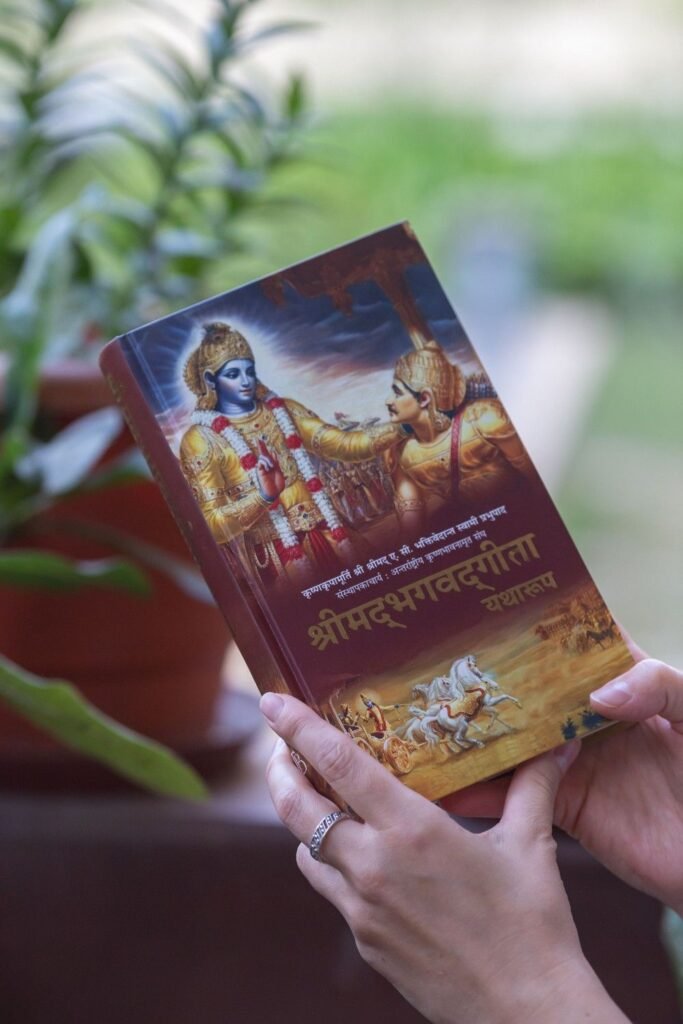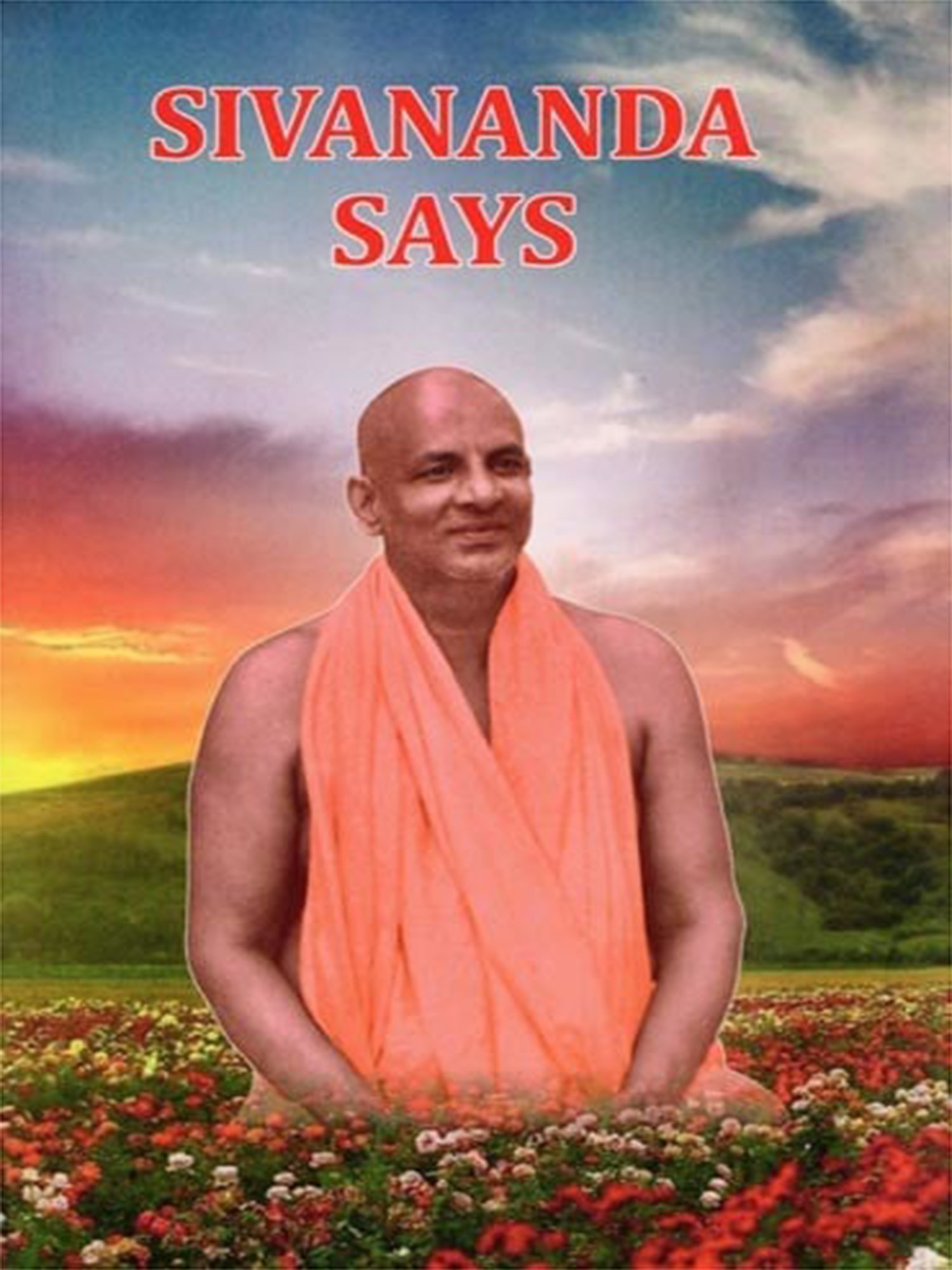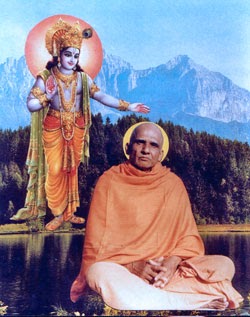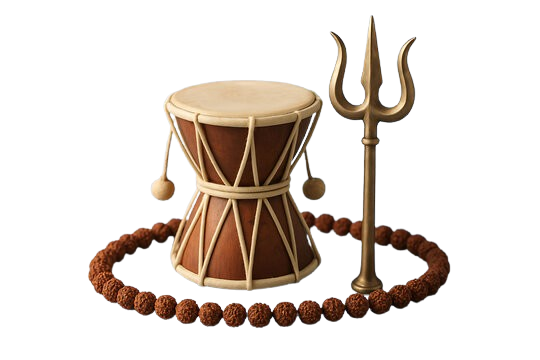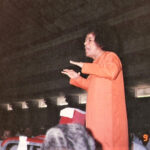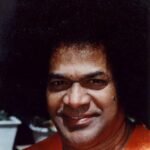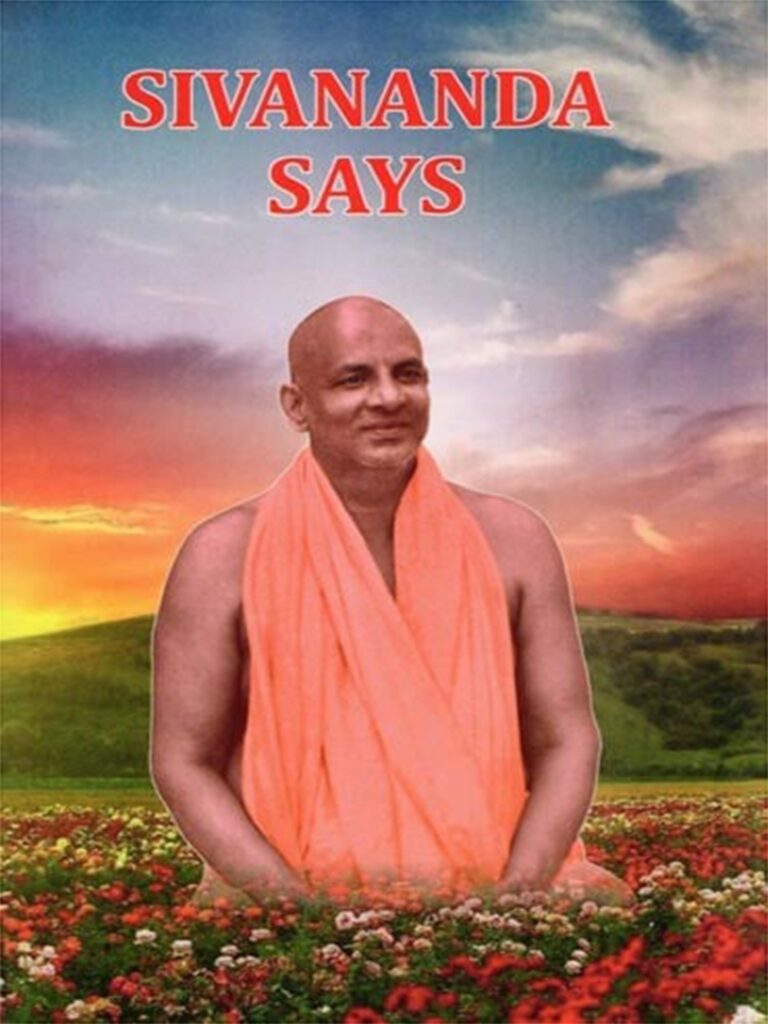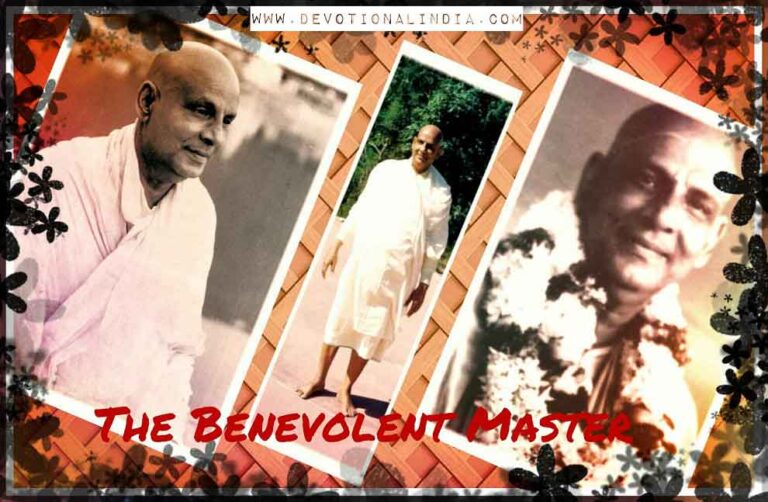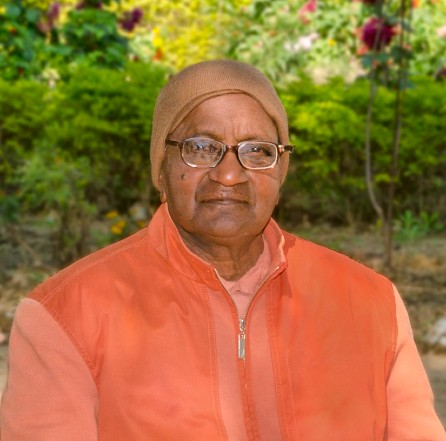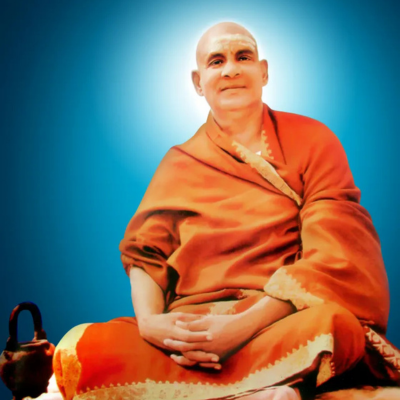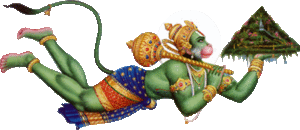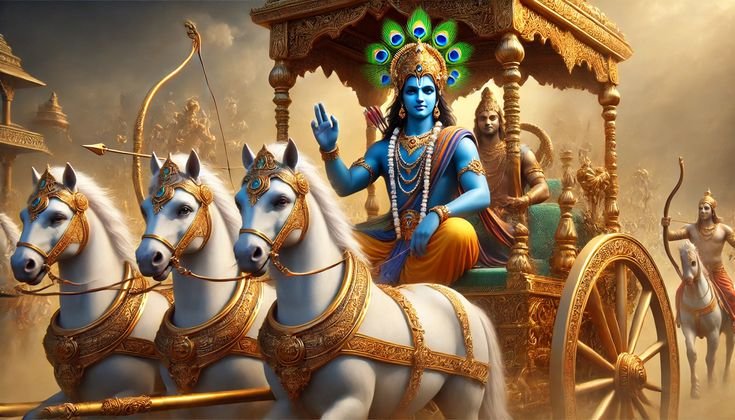Chapter Six
Chapter 6
Dhyana Yoga
The sixth chapter of the Bhagavad Gita is “Dhyana Yoga”. In this chapter, Krishna reveals the “Yoga of Meditation” and how to practise this Yoga. He discusses the role of action in preparing for Meditation, how performing duties in devotion purifies one’s mind and heightens one’s spiritual consciousness. He explains in detail the obstacles that one faces when trying to control their mind and the exact methods by which one can conquer their mind. He reveals how one can focus their mind on Paramatma and unite with the God.
Bhagavad Gita 6.1
श्री भगवानुवाच अनाश्रितः कर्मफलं कार्यं कर्म करोति यः। स संन्यासी च योगी च न निरग्निर्न चाक्रियः।।6.1।।
śhrī bhagavān uvācha anāśhritaḥ karma-phalaṁ kāryaṁ karma karoti yaḥ sa sannyāsī cha yogī cha na niragnir na chākriyaḥ
śhrī-bhagavān uvācha—the Supreme Lord said; anāśhritaḥ—not desiring; karma-phalam—results of actions; kāryam—obligatory; karma—work; karoti—perform; yaḥ—one who; saḥ—that person; sanyāsī—in the renounced order; cha—and; yogī—yogi; cha—and; na—not; niḥ—without; agniḥ—fire; na—not; cha—also; akriyaḥ—without activity
Translation
The Blessed Lord said: He who performs his bounden duty without depending on the fruits of his actions—he is a sannyasi and a yogi, not he who is without fire and without action.
Commentary
6.1 अनाश्रितः not depending (on)? कर्मफलम् fruit of action? कार्यम् bounden? कर्म duty? करोति performs? यः who? सः he? संन्यासी Sannyasi (ascetic)? च and? योगी Yogi? च and? न not? निरग्निः without fire? न not? च and? अक्रियः without action.Commentary Actions such as Agnihotra? etc.? performed without the expectation of their fruits purify the mind and become the means to Dhyana Yoga or the Yoga of Meditation. Karyam Karma bounden duty.Niragnih without fire. He who has renounced the daily rituals like Agnihotra? which are performed with the help of fire.Akriya without action. He who has renounced austerities and other meritorious acts like building resthouses? charitable dispensaries? digging wells? feeding the poor? etc.Sannyasi he who has renounced the fruits of his actions.Yogi he who has a steady mind. These two terms are applied to him in a secondary sense only. They are not used to denote that he is in reality a Sannyasi and a Yogi.The Sannyasi performs neither Agnihotra nor other ceremonies. But simply to omit these without genuine renunciation will not make one a real Sannyasi. (Cf.V.3)
Bhagavad Gita 6.2
यं संन्यासमिति प्राहुर्योगं तं विद्धि पाण्डव। न ह्यसंन्यस्तसङ्कल्पो योगी भवति कश्चन।।6.2।।
yaṁ sannyāsam iti prāhur yogaṁ taṁ viddhi pāṇḍava na hyasannyasta-saṅkalpo yogī bhavati kaśhchana
yam—what; sanyāsam—renunciation; iti—thus; prāhuḥ—they say; yogam—yog; tam—that; viddhi—know; pāṇḍava—Arjun, the son of Pandu; na—not; hi—certainly; asannyasta—without giving up; saṅkalpaḥ—desire; yogī—a yogi; bhavati—becomes; kaśhchana—anyone
Translation
Do you, O Arjuna, know that Yoga is what they call renunciation; no one indeed becomes a Yogi who has not renounced their thoughts.
Commentary
6.2 यम् which? संन्यासम् renunciation? इति thus? प्राहुः (they) call? योगम् Yoga? तम् that? विद्धि know? पाण्डव O Pandava? न not? हि verily? असंन्यस्तसङ्कल्पः one who has not renounced thoughts? योगी Yogi? भवति becomes? कश्चन anyone.Commentary Sankalpa is the working of the imagining faculty of the mind that makes plans for the future and guesses the results of plans so formed. No one can become a Karma Yogi who plans and schemes and expects fruits for his actions. No devotee of action who has not renounced the thought of the fruits of his actions can become a Yogi of steady mind. The thought of the fruits will certainly make the mind unsteady.Lord Krishna eulogises Karma Yoga here because it is the means or an external aid (Bahiranga Sadhana) to Dhyana Yoga. Karma Yoga is a steppingstone to
Dhyana Yoga. It leads to the Yoga of Meditation in due c
Bhagavad Gita 6.3
आरुरुक्षोर्मुनेर्योगं कर्म कारणमुच्यते। योगारूढस्य तस्यैव शमः कारणमुच्यते।।6.3।।
ārurukṣhor muner yogaṁ karma kāraṇam uchyate yogārūḍhasya tasyaiva śhamaḥ kāraṇam uchyate
ārurukṣhoḥ—a beginner; muneḥ—of a sage; yogam—Yog; karma—working without attachment; kāraṇam—the cause; uchyate—is said; yoga ārūḍhasya—of those who are elevated in Yog; tasya—their; eva—certainly; śhamaḥ—meditation; kāraṇam—the cause; uchyate—is said
Translation
For a sage who wishes to attain to Yoga, action is said to be the means; for the same sage who has attained Yoga, inaction is said to be the means.
Commentary
6.3 आरुरुक्षोः wishing to climb? मुनेः of a Muni or sage? योगम् Yoga? कर्म action? कारणम् the cause? उच्यते is said? योगारूढस्य of one who has attained to Yoga? तस्य of him? एव even? शमः inaction (iescence)? कारणम् the cause? उच्यते is said.Commentary For a man who cannot practise meditation for a long time and who is not able to keep his mind steady in meditation? action is a means to get himself enthroned in Yoga. Action purifies his mind and makes the mind fit for the practice of steady meditation. Action leads to steady concentration and meditation.For the sage who is enthroned in Yoga? Sama or renunciation of actions is said to be the means.The more perfectly he abstains from actions? the more steady his mind is? and the more peaceful,he is? the more easily and thoroughly does his mind get fixed in the Self. For a Brahmana there is no wealth like unto the knowledge of oneness and homogeneity (of the Self in all beings)? truthfulness? good character? steadiness? harmlessness? straightforwardness and renunciation of all actions. (Mahabharata? Santi Parva? 175.38)
Bhagavad Gita 6.4
यदा हि नेन्द्रियार्थेषु न कर्मस्वनुषज्जते। सर्वसङ्कल्पसंन्यासी योगारूढस्तदोच्यते।।6.4।।
yadā hi nendriyārtheṣhu na karmasv-anuṣhajjate sarva-saṅkalpa-sannyāsī yogārūḍhas tadochyate
yadā—when; hi—certainly; na—not; indriya-artheṣhu—for sense-objects; na—not; karmasu—to actions; anuṣhajjate—is attachment; sarva-saṅkalpa—all desires for the fruits of actions; sanyāsī—renouncer; yoga-ārūḍhaḥ—elevated in the science of Yog; tadā—at that time; uchyate—is said
Translation
When a person is not attached to the sense-objects or to actions, having renounced all thoughts, then they are said to have attained Yoga.
Commentary
6.4 यदा when? हि verily? न not? इन्द्रयार्थेषु in senseobjects? न not? कर्मसु in actions? अनुषज्जते is attached? सर्वसङ्कल्पसंन्यासी renouncer of all thoughts? योगारूढः one who has attained to Yoga? तदा then? उच्यते is said.Commentary Yogarudha he who is enthroned or established in Yoga. When a Yogi? by keeping the mind ite steady? by withdrawing it from the objects of the senses? has attachment neither for sensual objects such as sound? nor for the actions (Karmas? Cf. notes to V.13)? knowing that they are of no use to him when he has renounced all thoughts which generate various sorts of desires for the objects of this world and of the next? then he is said to have become a Yogarudha.Do not think of senseobjects. The desires will die by themselves. How can you free yourself from thinking of the objects Think of God or the Self. Then you can avoid thinking of the objects. Then you can free yourself from thinking of the objects of the senses.Renunciation of thoughts implies that all desires and all actions should be renounced? because all desires are born of thoughts. You think first and then act (strive) afterwards to possess the objects of your desire for enjoyment.Whatever a man desires? that he willsAnd whatever he wills? that he does. — Brihadaranyaka Upanishad? 4.4.5Renunciation of all actions necessarily follows from the renunciation of all desires.O desire I know where thy root lies. Thou art born of Sankalpa (thought). I will not think of thee and thou shalt cease to exist along with the root. — Mahabharata? Santi Parva? 177.25Indeed desire is born of thought (Sankalpa)? and of thought? Yajnas are born. — Manu Smriti? II.2
Bhagavad Gita 6.5
उद्धरेदात्मनाऽऽत्मानं नात्मानमवसादयेत्। आत्मैव ह्यात्मनो बन्धुरात्मैव रिपुरात्मनः।।6.5।।
uddhared ātmanātmānaṁ nātmānam avasādayet ātmaiva hyātmano bandhur ātmaiva ripur ātmanaḥ
uddharet—elevate; ātmanā—through the mind; ātmānam—the self; na—not; ātmānam—the self; avasādayet—degrade; ātmā—the mind; eva—certainly; hi—indeed; ātmanaḥ—of the self; bandhuḥ—friend; ātmā—the mind; eva—certainly; ripuḥ—enemy; ātmanaḥ—of the self
Translation
One should raise oneself by one’s own self alone; let not one lower oneself; for the self alone is one’s own friend, and the self alone is one’s own enemy.
Commentary
6.5 उद्धरेत् should raise? आत्मना by the Self? आत्मानम् the self? न not? आत्मानम् the self? अवसादयेत् let (him) lower? आत्मा the Self? एव only? हि verily? आत्मनः of the self? बन्धुः friend? आत्मा the Self? एव only? रिपुः the enemy? आत्मनः of the self.Commentary Practise Yog. Discipline the senses and the mind. Elevate yourself and become a Yogarudha. Attain to Yoga. Shine gloriously as a dynamic Yogi.
Do not sink into the ocean of Samsara (transmigration). Do not become a wordlyminded man. Do not become a slave of lust? greed and anger. Rise above worldliness? become divine and attain Godhead.You alone are your friend you alone are your enemy. The socalled worldly friend is not your real friend? because he gets attached to you? wastes your time and puts obstacles on your path of Yoga. He is very selfish and keeps friendship with you only to extract something. If he is not able to get from you the object of his selfish interest? he forsakes you. Therefore he is your enemy in reality. If you are attached to your friend on account of delusion or affection? this will become a cause of your bondage to Samsara.Friends and enemies are not outside. They exist in the mind only. It is the mind that makes a friend an enemy and an enemy a friend. Therefore the Self alone is the friend of oneself? and the Self alone is the enemy of oneself. The lower mind or the Asuddha Manas (impure mind) is your real enemy because it binds you to the Samsara? and the higher mind or the Sattvic mind (Suddha Manas or the pure mind) is your real friend? because it helps you in the attainment of Moksha.
Bhagavad Gita 6.6
बन्धुरात्माऽऽत्मनस्तस्य येनात्मैवात्मना जितः। अनात्मनस्तु शत्रुत्वे वर्तेतात्मैव शत्रुवत्।।6.6।।
bandhur ātmātmanas tasya yenātmaivātmanā jitaḥ anātmanas tu śhatrutve vartetātmaiva śhatru-vat
bandhuḥ—friend; ātmā—the mind; ātmanaḥ—for the person; tasya—of him; yena—by whom; ātmā—the mind; eva—certainly; ātmanā—for the person; jitaḥ—conquered; anātmanaḥ—of those with unconquered mind; tu—but; śhatrutve—for an enemy; varteta—remains; ātmā—the mind; eva—as; śhatru-vat—like an enemy
Translation
The Self is the friend of the self of him by whom the Self has been conquered; but to the unconquered self, this Self stands in the position of an enemy, like an external foe.
Commentary
6.6 बन्धुः friend? आत्मा the Self? आत्मनः of the self? तस्य his? येन by whom? आत्मा the self? एव even? आत्मना by the Self? जितः is conered? अनात्मनः of unconered self? तु but? शत्रुत्वे in the place of an enemy? वर्तेत would remain? आत्मा the Self? एव even? शत्रुवत् like an enemy.Commentary Coner the lower mind through the higher mind. The lower mind is your enemy. The higher mind is your friend. If you make friendship with the higher mind you can subdue the lower mind ite easily. The lower mind is filled with Rajas and Tamas (passion and darkness). The higher mind is filled with Sattva or purity.The Self is the friend of one who is selfcontrolled? and who has subjugated the lower mind and the senses. But the Self is an enemy of one who has no selfrestraint? and who has not subdued the lower mind and the senses. Just as an external enemy does harm to him? so also his own (lower) self (mind) does harm to him. The lower mind injures him severely. The highest Self or Atman is the primary Self. Mind also is self. This is the secondary self.
Bhagavad Gita 6.7
जितात्मनः प्रशान्तस्य परमात्मा समाहितः। शीतोष्णसुखदुःखेषु तथा मानापमानयोः।।6.7।।
jitātmanaḥ praśhāntasya paramātmā samāhitaḥ śhītoṣhṇa-sukha-duḥkheṣhu tathā mānāpamānayoḥ
jita-ātmanaḥ—one who has conquered one’s mind; praśhāntasya—of the peaceful; parama-ātmā—God; samāhitaḥ—steadfast; śhīta—in cold; uṣhṇa—heat; sukha—happiness; duḥkheṣhu—and distress; tathā—also; māna—in honor; apamānayoḥ—and dishonor
Translation
The Supreme Self of him who is self-controlled and peaceful remains balanced in cold and heat, pleasure and pain, as well as in honor and dishonor.
Commentary
6.7 जितात्मनः of the selfcontrolled? प्रशान्तस्य of the peaceful? परमात्मा the Supreem Self? समाहितः balanced? शीतोष्णसुखदुःखेषु in cold and heat? pleasure and pain? तथा as also? मानापमानयोः in honour and dishonour.Commentary The selfcontrolled Yogi who is rooted in the Self keeps poise amidst the pairs of opposites (Dvandvas) or the alternating waves of cold and heat? pleasure and pain? honour and dishonour. When the Yogi has subdued his senses? when his mind is balanced and peaceful under all conditions? when he is not in the least influenced by the pairts of opposites? when he has renounced all actions? then the Highest Self really becomes his own Self. He attains to Selfrealisation. As he rests in hiw own Self? he is ever serene or tranil he is not affected by the pairs of opposites? and he stands as adamant in the face of the changing conditions of Nature.
Bhagavad Gita 6.8
ज्ञानविज्ञानतृप्तात्मा कूटस्थो विजितेन्द्रियः। युक्त इत्युच्यते योगी समलोष्टाश्मकाञ्चनः।।6.8।।
jñāna-vijñāna-tṛiptātmā kūṭa-stho vijitendriyaḥ yukta ityuchyate yogī sama-loṣhṭāśhma-kāñchanaḥ
jñāna—knowledge; vijñāna—realized knowledge, wisdom from within; tṛipta ātmā—one fully satisfied; kūṭa-sthaḥ—undisturbed; vijita-indriyaḥ—one who has conquered the senses; yuktaḥ—one who is in constant communion with the Supreme; iti—thus; uchyate—is said; yogī—a yogi; sama—looks equally; loṣhṭra—pebbles; aśhma—stone; kāñchanaḥ—gold
Translation
The Yogi who is satisfied with the knowledge and wisdom of the Self, who has conquered the senses, and to whom a clod of earth, a piece of stone, and gold are all the same, is said to have attained Nirvikalpa Samadhi.
Commentary
6.8 ज्ञानविज्ञानतृप्तात्मा one who is satisfied with knowledge and wisdom (Selfrealisation)? कूटस्थः unshaken? विजितेन्द्रियः who has conered the senses? युक्तः united or harmonised? इति thus? उच्यते is said? योगी Yogi? समलोष्टाश्मकाञ्चनः one to whom a lump of earth? a stone and gold are the same.Commentary Jnana is ParokshaJnana or theoretical knowledge from the study of the scriptures. Vijnana is Visesha Jnana or Aparoksha Jnana? i.e.? direct knowledge of the Self through Selfrealisation (spiritual experience or Anubhava).Kutastha means changeless like the anvil. Various kinds of iron pieces are hammered and shaped on the anvil? but the anvil remains unchanged. Even so the Yogi remains unshaken or unchanged or unaffected though he comes in contact with the senseobjects. So he is called Kutastha. Kutastha is another name of Brahman? the silent witness of the mind. (Cf.V.18VI.18)
Bhagavad Gita 6.9
सुहृन्मित्रार्युदासीनमध्यस्थद्वेष्यबन्धुषु। साधुष्वपि च पापेषु समबुद्धिर्विशिष्यते।।6.9।।
suhṛin-mitrāryudāsīna-madhyastha-dveṣhya-bandhuṣhu sādhuṣhvapi cha pāpeṣhu sama-buddhir viśhiṣhyate
su-hṛit—toward the well-wishers; mitra—friends; ari—enemies; udāsīna—neutral persons; madhya-stha—mediators; dveṣhya—the envious; bandhuṣhu—relatives; sādhuṣhu—pious; api—as well as; cha—and; pāpeṣhu—the sinners; sama-buddhiḥ—of impartial intellect; viśhiṣhyate—is distinguished
Translation
He who is of the same mind towards the good-hearted, friends, enemies, the indifferent, the neutral, the hateful, the relatives, the righteous, and the unrighteous, excels.
Commentary
6.9 सुह्यन्मित्रार्युदासीनमध्यस्थद्वेष्यबन्धुषु in the goodhearted? in friends? in enemies? in the indifferent? in neutrals? in haters and in relatives? साधुषु in the righteous? अपि also? च and? पापेषु in the unrighteous?,समबुद्धिः one who has eal mind? विशिष्यते excels.Commentary He excels He is the best among the Yogarudhas.Samabudhhi is eanimity or evenness of mind. A Yogi of Samabuddhi has eal vision. He is ite impartial. He is the same to all. He makes no difference with reference to caste? creed or colour. He loves all as his own self? as rooted in the Self.A goodhearted man does good to others without expecting any servie from them in return.Udasina is one who is ite indifferent.A neutral is one who does not join any of the two contending parties. He stands as a silent spectator or witness.The righteous are those who do righteous actions and follow the injunctions of the scriptures.The unrighteous are those who do wrong and forbidden actions? who inure others and who do not follow the scriptures.
Bhagavad Gita 6.10
योगी युञ्जीत सततमात्मानं रहसि स्थितः। एकाकी यतचित्तात्मा निराशीरपरिग्रहः।।6.10।।
yogī yuñjīta satatam ātmānaṁ rahasi sthitaḥ ekākī yata-chittātmā nirāśhīr aparigrahaḥ
yogī—a yogi; yuñjīta—should remain engaged in meditation; satatam—constantly; ātmānam—self; rahasi—in seclusion; sthitaḥ—remaining; ekākī—alone; yata-chitta-ātmā—with a controlled mind and body; nirāśhīḥ—free from desires; aparigrahaḥ—free from desires for possessions for enjoyment
Translation
Let the yogi constantly strive to keep the mind steady, remaining in solitude, alone, with the body and mind controlled, and free from hope and greed.
Commentary
6.10 योगी the Yogi? युञ्जीत let him keep the mind steady? सततम् constantly? आत्मानम् self? रहसि in solitude? स्थितः remaining? एकाकी alone? यतचित्तात्मा one with the mind and the body controlled? निराशीः free from hope? अपरिग्रहः noncovetousness.Commentary The Yogi who treads the path of renunciation (NivrittiMarga) can practise meditation in a solitary cave in the mountains. He should renounce all possessions.A householder with Yogic tendencies and spiritual inclination? can practise meditation in a solitary and iet room in his own house or any solitary place on the banks of any holy river (during the holidays or throughout the year if he is a wholetime aspirant or if he has retired from service).The practice must be constant. Only then can one attain Selfrealisation surely and ickly. He who practises meditation by fits and starts and for a few minutes daily will not be able to achieve any tangible results in Yoga. The Yogic aspirant should be free from hope? desire and greed. Only then will he have a steady mind. Hope? desire and greed make the mind ever restless and turbulent. They are the enemies of peace and Selfknowledge. The aspirant should not have many possessions either.
only keep those articles which are absolutely necessary for the maintenance of his body. If there are many possessions? the mind will be ever thinking of them and attempting to protect them.It you are well established in the practice of Pratyahara? Sama and Dama (withdrawal of the senses? control of mind and the body respectively)? if you have the senses under your full control? you can find perfect solitude and peace even in the most crowded and noisy place of a big city. If the senses are turbulent? if you have not got the power to withdraw them? you will have no peace of mind even in a solitary cave of the Himalayas. A disciplined Yogi who has controlled the senses and the mind can enjoy peace of mind in a solitary cave. A passionate man who has not controlled the senses and the mind will only be building castles in the air if he lives in a solitary cave in a mountain.He who has reduced his wants? who has not a bit of attraction for the world? who has,discrimination and burning aspiration for liberation? and who has observed Mauna (the vow of silence) for months together will be able to live in a cave.You should have perfect control over the body through the regular practice of Yoga.
Asanas before you take to serious and constant meditation.Aparigraha means noncovetousness? freedom from possessions.The spiritual aspirant need not bother himself about his bodily needs. Everything is provided by God. Everything is prearranged by Mother Nature. She looks after the bodily needs of all very carefully in a more efficient manner than they themselves would do. She knows beter what the reirements are and provides them then and there. Understand the mysterious ways of Mother Nature and become wise. Be grateful to Her for Her unie kindness? grace and mercy.If you want to retire into solitue for the practice of meditation? and if you are a householder with a thirst for intense spiritual Sadhana? you cannot all of a sudden sever your connection with your family. Sudden severance of worldly ties may produce intense mental agony in you and shock in them. You will have to break the ties gradually. Stay for a week or a month in seclusion to begin with. Then gradually prolong the period. They will not feel the pangs of separation from you.As your will has become very weak? as you had no religious discipline or training in schools and colleges when you were young?
the sway of materialistic influences? it is necessary for you to go in for seclusion for some days or weeks (during the Chritstmas? Easter or other holidays) to practise rigorous Japa and meditation and to develop your willpower.Those who have fixed up their sons in life and who have retired from service? and who have discharged their duties as householders can remain in seclusion for four or five years and practise intense meditation and Tapas (penance) for selfpurification and Selfrealisation. This is like entering a university for higher studies or postgraduate course of study. When the Tapas is over? and when they have attained to Selfknowledge? they should come out and share their knowledge of the Self with others through lectures? conversations? discourses or hearttoheart talks according to their capacity and disposition.How can sensecontrol be tested in a lonely forest where there are no temptations The Yogic student living in a cave should test himself after he has sufficiently advanced? by coming into the society of people. But he should not test himself every now and then like the man who removed the young plant daily after watering it to see whether it had struck deep root or not.

Bhagavad Gita 6.11
शुचौ देशे प्रतिष्ठाप्य स्थिरमासनमात्मनः। नात्युच्छ्रितं नातिनीचं चैलाजिनकुशोत्तरम्।।6.11।।
śhuchau deśhe pratiṣhṭhāpya sthiram āsanam ātmanaḥ nātyuchchhritaṁ nāti-nīchaṁ chailājina-kuśhottaram
śhuchau—in a clean; deśhe—place; pratiṣhṭhāpya—having established; sthiram—steadfast; āsanam—seat; ātmanaḥ—his own; na—not; ati—too; uchchhritam—high; na—not; ati—too; nīcham—low; chaila—cloth; ajina—a deerskin; kuśha—kuśh grass; uttaram—one over the other
Translation
In a clean spot, having established a firm seat of his own, neither too high nor too low, made of cloth, skin, and kusha grass layered one over the other.
Commentary
6.11 शुचौ in a clean? देशे spot? प्रतिष्ठाप्य having established? स्थिरम् firm? आसनम् seat? आत्मनः his own? न not? अत्युच्छ्रितम् very high? न not? अतिनीचम् very low? चैलाजिनकुशोत्तरम् a cloth? skin and Kusagrass? one over the other.Commentary In this verse the Lord has prescribed the external seat for practising meditation. Details of the pose are given in verse 13.Spread the Kusagrass on the ground first. Over this spread a tigerskin or deerskin over this spread a white cloth.Sit on a naturally clean spot? such as the bank of a river. Or? make the place clean? wherever you want to practise meditation.
Bhagavad Gita 6.12
तत्रैकाग्रं मनः कृत्वा यतचित्तेन्द्रियक्रियः। उपविश्यासने युञ्ज्याद्योगमात्मविशुद्धये।।6.12।।
tatraikāgraṁ manaḥ kṛitvā yata-chittendriya-kriyaḥ upaviśhyāsane yuñjyād yogam ātma-viśhuddhaye
tatra—there; eka-agram—one-pointed; manaḥ—mind; kṛitvā—having made; yata-chitta—controlling the mind; indriya—senses; kriyaḥ—activities; upaviśhya—being seated; āsane—on the seat; yuñjyāt yogam—should strive to practice yog; ātma viśhuddhaye—for purification of the mind;
Translation
There, having made the mind one-pointed, with the actions of the mind and senses controlled, let him, seated on the seat, practice Yoga for the purification of the self.
Commentary
6.12 तत्र there? एकाग्रम् onepointed? मनः the mind? कृत्वा having made? यतचित्तेन्द्रियक्रियः one who has controlled the actions of the mind and the senses? उपविश्य being seated? आसने on the seat? युञ्ज्यात् let him practise? योगम् Yoga? आत्मविशुद्धये for the purification of the self.Commentary The self means the mind. The real Supreme Self is the Atma. This is Primary (Mukhya). Mind also is the self. But this is used in a secondary sense (Gauna). Mukhya Atma is Brahman or the highest Self. Gauna Atma is the mind.Make the mind onepointed by collecting all its dissipated rays by the practice of Yoga. Withdraw it from all senseobjects again and again and try to fix it steadily on your Lakshya or point of meditation or centre. Gradually you will have concentration of the mind or onepointedness.
You must be very regular in your practice. Only then will you succeed. Regularity is of paramount importance. You should know the ways and habits of the mind through daily introspection? selfanalysis or selfexamination. You should have a knowledge of the laws of the mind. Then it will be easy for you to check the wandering mind. When you sit for meditation? and when you deliberately attempt to forget the worldly objects? all sorts of worldly thoughts will crop up in your mind and disturb your meditation. You will be ite astonished. Old thoughts that you entertained several years ago? and old memories of past enjoyments will bubble up and force the mind to wander in all directions. You will find that the trapdoor of the vast subconscious mind is opened or the lid of the storehouse of thoughts within is lifted up and the thoughts gush out in a continous stream. The more you attempt to still them? the more they will bubble up with redoubled force and strength.Be not discouraged. Nil desperandum. Never despair. Through regular and constant meditation you can purify the subconscious mind and its constant memories. The fire of meditation will burn all thoughts. Be sure of this. Meditation is a potent.
antidote to annihilate the poisonous worldly thoughts. Be assured of this.Meditation on the immortal Self will act like a dynamite and blow up all thoughts and memories in the conscious mind. If the thoughts trouble you much? do not try to suppress them by force. Be a silent witness as in a bioscope. They will subside gradually. Then try to root them out through regual silent meditation.During introspection you can clearly observe the rapid shifting of the mind from one line of thought to another. Herein lies a chance for you to mould the mind properly and direct the thoughts and the mental energy in the divine channel. You can rearrange the thoughts and make new associations on a new Sattvic basis. You can throw out wordly and useless thoughts. Just as you remove the weeds and throw them out? you can throw these out? and you can cultivate sublime? divine thoughts in the divine garden of your mind. This is a very patient work. This is a stupendous task indeed. But for a Yogi of determination who has the grace of the Lord and an iron will it is nothing.Calm the bubbling emotions? sentiments? instincts and impulses gradually through silent meditation. You can give a new orientation to your feelings by gradual and systematic practice. You can entirely transmute your wordly nature into divine nature. You can exercise supreme control over the nervecurrents? muscles? the five sheaths (of the Self)? emotions? impulses and instincts through meditation.
Bhagavad Gita 6.13
समं कायशिरोग्रीवं धारयन्नचलं स्थिरः। संप्रेक्ष्य नासिकाग्रं स्वं दिशश्चानवलोकयन्।।6.13।।
samaṁ kāya-śhiro-grīvaṁ dhārayann achalaṁ sthiraḥ samprekṣhya nāsikāgraṁ svaṁ diśhaśh chānavalokayan
samam—straight; kāya—body; śhiraḥ—head; grīvam—neck; dhārayan—holding; achalam—unmoving; sthiraḥ—still; samprekṣhya—gazing; nāsika-agram—at the tip of the nose; svam—own; diśhaḥ—directions; cha—and; anavalokayan—not looking
Translation
Let him firmly hold his body, head, and neck erect and still, gazing at the tip of his nose without looking around.
Commentary
6.13 समम् erect? कायशिरोग्रीवम् body? head and neck? धारयन् holding? अचलम् still? स्थिरः steady? संप्रेक्ष्य,gazing at? नासिकाग्रम् tip of the nose? स्वम् ones own? दिशः directions? च and? अनवलोकयन् not looking.Commentary The Lord describes here the pose or Asana and the Drishti (gaze) in this verse.You cannot practise meditation without a firm seat. If the body is unsteady? the mind will also become unsteady. There is an intimate connection between the body and the mind.You should not shake the body even a bit. You should attain mastery over the Asana (AsanaJaya) by daily practice. You should be as firm as a statue or a rock. If you keep the body? head and neck erect? the spinal cord also will be erect and the Kundalini will rise up steadily through the subtle nervechannel (Nadi) called the Sushumna. Sit in the lotus pose or the adept pose. This will help you in maintaining the nervous eilibrium and mental poise. You should steadily direct your gaze towards the tip of your nose. This is known as the Nasikagra Drishti. The other gaze is the Bhrumadhya Drishti or gazing between the two eyrows where the psychic centre known as the Ajna Chakra is situated. This is described in chapter V? verse 27.
In Bhrumadhya Drishti direct the gaze towards the Ajna Chakra with closed eyes. If you practise this with open eyes? it may produce headache. Foreign particles or dust may fall into the eyes. There may be distraction of the mind also. Do not strain the eyes. Practise gently. When you practise concentration at the tip of the nose you will experience DivyaGandha (various aromas). When you concentrate your gaze at the Ajna Chakra you will experience DivyaJyotis (perception of supraphenomenal lights). This is an experience to give you encouragement? push you up in the spiritual path and convince you of the existence of transcendental or supraphysical things. Do not stop your Sadhana. Yogins and those Bhaktas who meditate on Lord Siva concentrate on the Ajna Chakra with the Bhrumadhya Drishti. You can select whichever Drishti suits you best.Though the gaze is directed towards the tip of the nose when the eyes are halfclosed and the eyalls are steady the mind should be fixed only on the self. Therefore you will have to gaze? as it were? at the tip of the nose. In chapter VI? verse 25? the Lord says Having made the mind abide in the Self? let him not think of anything. Gazing at the tip of the nose will soon bring about concentration of the mind.Whichever be the point selected? visualise your own tutelary deity there and feel His Living Presence.
Bhagavad Gita 6.14
प्रशान्तात्मा विगतभीर्ब्रह्मचारिव्रते स्थितः। मनः संयम्य मच्चित्तो युक्त आसीत मत्परः।।6.14।।
praśhāntātmā vigata-bhīr brahmachāri-vrate sthitaḥ manaḥ sanyamya mach-chitto yukta āsīta mat-paraḥ
praśhānta—serene; ātmā—mind; vigata-bhīḥ—fearless; brahmachāri-vrate—in the vow of celibacy; sthitaḥ—situated; manaḥ—mind; sanyamya—having controlled; mat-chittaḥ—meditate on me (Shree Krishna); yuktaḥ—engaged; āsīta—should sit; mat-paraḥ—having me as the supreme goal
Translation
Serene-minded, fearless, firm in the vow of a Brahmachari, having controlled their mind, thinking of Me and balanced in mind, let them sit, having Me as their supreme goal.
Commentary
6.14 प्रशान्तात्मा sereneminded? विगतभीः fearless? ब्रह्मचारिव्रते in the vow of Brahmacharya? स्थितः firm? मनः the mind? संयम्य having controlled? मच्चित्तः thinking on Me? युक्तः balanced? आसीत let him sit? मत्परः Me as the supreme goal.Commentary The spiritual aspirant should possess serenity of mind. The Divine Light can descend only in a serene mind. Serenity is attained by the eradication of Vasanas or desires and cravings. He should be fearless. This is the most important alification. A timid man or a coward is very far from Selfrealisation.A Brahmachari (celibate) should serve his Guru or the spiritual preceptor wholeheartedly and should live on alms. This also constitutes the BrahmachariVrata. The aspirant should control the modifications of the mind. He should be balanced in pleasure and pain? heat and cold? honour and dishonour. He should ever think of the Lord and take Him as the Supreme Goal.Brahmacharya also means continence. Semen or the vital fluid tones the nerves and the brain? and energises the whole system. That Brahmachari who has preserved this vital force by the vow,of celibacy and sublimated it into Ojas Sakti or radiant spiritual power can practise steady meditation for a long period. Only he can ascend the ladder of Yoga. Without Brahmacharya or celibacy not an iota or spiritual progress is possible. Continence is the very foundation on which the superstructure of meditation and Samadhi can be built up. Many persons waste this vital energy — a great spiritual treasure indeed — when they become blind and lose their power of reason under sexual excitement. Pitiable is their lot They cannot make substantial progress in Yoga.
Bhagavad Gita 6.15
युञ्जन्नेवं सदाऽऽत्मानं योगी नियतमानसः। शान्तिं निर्वाणपरमां मत्संस्थामधिगच्छति।।6.15।।
yuñjann evaṁ sadātmānaṁ yogī niyata-mānasaḥ śhantiṁ nirvāṇa-paramāṁ mat-sansthām adhigachchhati
yuñjan—keeping the mind absorbed in God; evam—thus; sadā—constantly; ātmānam—the mind; yogī—a yogi; niyata-mānasaḥ—one with a disciplined mind; śhāntim—peace; nirvāṇa—liberation from the material bondage; paramām—supreme; mat-sansthām—abides in me; adhigachchhati—attains
Translation
Thus, always keeping the mind balanced, the yogi, with the mind controlled, attains the peace abiding in Me, culminating in liberation.
Commentary
6.15 युञ्जन् balancing? एवम् thus? सदा always? आत्मानम् the self? योगी Yogi? नियतमानसः one with the controlled mind? शान्तिम् to peace? निर्वाणपरमाम् that which culminates in Nirvana (Moksha)? मत्संस्थाम् abiding in Me? अधिगच्छति attains.Commentary Thus in the manner prescribed in the previous verse.The Supreme Self is an embodiment of peace. It is an ocean of peace. When one attains to the supreme peace of the Eternal? by controlling the modifications of the mind and keeping it always balanced? he attains to liberation or perfection.
Bhagavad Gita 6.16
नात्यश्नतस्तु योगोऽस्ति न चैकान्तमनश्नतः। न चातिस्वप्नशीलस्य जाग्रतो नैव चार्जुन।।6.16।।
nātyaśhnatastu yogo ’sti na chaikāntam anaśhnataḥ na chāti-svapna-śhīlasya jāgrato naiva chārjuna
na—not; ati—too much; aśhnataḥ—of one who eats; tu—however; yogaḥ—Yog; asti—there is; na—not; cha—and; ekāntam—at all; anaśhnataḥ—abstaining from eating; na—not; cha—and; ati—too much; svapna-śhīlasya—of one who sleeps; jāgrataḥ—of one who does not sleep enough; na—not; eva—certainly; cha—and; arjuna—Arjun
Translation
Verily, Yoga is not possible for him who eats too much, nor for him who does not eat at all, nor for him who sleeps too much, nor for him who is always awake, O Arjuna.
Commentary
6.16 न not? अत्यश्नतः of one who eats too much? तु verily? योगः Yoga? अस्ति is? न not? च and? एकान्तम् at all? अनश्नतः of one who does not eat? न not? च and? अतिस्वप्नशीलस्य of one who sleeps too much? जाग्रतः one who is awake? न not? एव even? च and? अर्जुन O Arjuna.Commentary In this verse the Lord prescribes the diet for the students of Yoga. You must observe moderation in eating and sleeping.
if you eat too much you will feel drowsy? and sleep will overpower you. You will get indigestion? flatulence? diseases of the bowels and the liver. If you eat too little you will get weakness and you will not be able to sit for a long time in meditation. You should eat neither more nor less than what is actually necessary for maintaining the body in a healthy and strong state.It may mean also that success in Yoga is not possible for him who eats more than the antity prescribed in the text books on Yoga. They prescribe Half the stomach must be filled with food a arter with water and the remaining fourth must be empty for the free movement of air. This is the Mitahara or moderate diest for a student of Yoga.If you sleep too much you will become lethargic. The mind will be dull and the body will be heavy. You cannot meditate. If you sleep too little you will experience drowsiness. You will sleep during meditation. Keep the golden medium. You will have rapid progress in Yoga.
Bhagavad Gita 6.17
युक्ताहारविहारस्य युक्तचेष्टस्य कर्मसु। युक्तस्वप्नावबोधस्य योगो भवति दुःखहा।।6.17।।
yuktāhāra-vihārasya yukta-cheṣhṭasya karmasu yukta-svapnāvabodhasya yogo bhavati duḥkha-hā
yukta—moderate; āhāra—eating; vihārasya—recreation; yukta cheṣhṭasya karmasu—balanced in work; yukta—regulated; svapna-avabodhasya—sleep and wakefulness; yogaḥ—Yog; bhavati—becomes; duḥkha-hā—the slayer of sorrows
Translation
Yoga becomes the destroyer of pain for him who is moderate in eating and recreation (such as walking, etc.), who exercises moderation in action, and who is moderate in sleep and wakefulness.
Commentary
6.17 युक्ताहारविहारस्य of one who is moderate in eating and recreation (such as walking? etc.)? युक्तचेष्टस्य कर्मसु of one who is moderate in exertion in actions? युक्तस्वप्नावबोधस्य of one who is moderate in sleep and wakefulness? योगः Yoga? भवति becomes? दुःखहा the destroyer of pain.Commentary In this verse the Lord prescribes for the student of Yoga? diet? recreation and th like. The student of Yoga should always adopt the happy medium or the middle course. Lord Buddha went to the extremes in the beginning in matters of food? drink? etc. He was very abstemious and became extremely weak. He tortured his body very much. Therefore he was not able to attain to success in Yoga. Too much of austerity is not necessary for Selfrealisation. This is condemned by the Lord in chapter XVII? verses 5 and 6. Austerity should not mean selftorture. Then it becomes diabolical. The Buddi Yoga of Krishna is a wise approach to austerity. Some aspirants take asceticism as the goal it is only the means but not the end. The nervous system is extremely,sensitive. It responds even to very slight changes and causes distraction of the mind. It is? therefore? very necessary that you should lead a very regulated and disciplined life and should be moderate in food? sleep and recreation. Take measured food. Sleep and wake up at the prescribed time. Sleeo at 9 or 10 p.m. and get up at 3 or 4 a.m. Only then will you attain to success in Yoga which will kill all sorts or pains and sorrows of this life.
Bhagavad Gita 6.18
यदा विनियतं चित्तमात्मन्येवावतिष्ठते। निःस्पृहः सर्वकामेभ्यो युक्त इत्युच्यते तदा।।6.18।।
yadā viniyataṁ chittam ātmanyevāvatiṣhṭhate niḥspṛihaḥ sarva-kāmebhyo yukta ityuchyate tadā
yadā—when; viniyatam—fully controlled; chittam—the mind; ātmani—of the self; eva—certainly; avatiṣhṭhate—stays; nispṛihaḥ—free from cravings: sarva; kāmebhyaḥ—for yearning of the senses; yuktaḥ—situated in perfect Yog; iti—thus; uchyate—is said; tadā—then
Translation
When the perfectly controlled mind rests in the Self alone, free from longing for any of the objects of desire, then it is said, ‘He is united’.
Commentary
6.18 यदा when? विनियतम् perfectly controlled? चित्तम् mind? आत्मनि in the Self? एव only? अवतिष्ठते rests? निःस्पृहः free from longing? सर्वकामेभ्यः from all (objects of) desires? युक्तः united? इति thus? उच्यते is said? तदा then.Commentary Perfectly controlled mind The mind with onepointedness.When all desires for the objects of pleasure seen or unseen die? the mind becomes very peaceful and rests steadily in the Supreme Self within. As the Yogi is perfectly harmonised? as he has attained to oneness with the Self and as he has become identical with Brahman? sense phenomena and bodily affections do not disturb him. He is conscious of his immortal? imperishable and invincible nature.Yukta means united (with the Self) or harmonised or balanced. Without union with the Self neither harmony nor balance nor Samadhi is possible. (Cf.V.23VI.8)
Bhagavad Gita 6.19
यथा दीपो निवातस्थो नेङ्गते सोपमा स्मृता। योगिनो यतचित्तस्य युञ्जतो योगमात्मनः।।6.19।।
yathā dīpo nivāta-stho neṅgate sopamā smṛitā yogino yata-chittasya yuñjato yogam ātmanaḥ
yathā—as; dīpaḥ—a lamp; nivāta-sthaḥ—in a windless place; na—does not; iṅgate—flickers; sā—this; upamā—analogy; smṛitā—is considered; yoginaḥ—of a yogi; yata-chittasya—whose mind is disciplined; yuñjataḥ—steadily practicing; yogam—in meditation; ātmanaḥ—on the Supreme
Translation
As a lamp placed in a windless spot does not flicker, so is the Yogi of a controlled mind, who practices Yoga in the Self, compared.
Commentary
6.19 यथा as? दीपः lamp? निवातस्थः placed in a windless place? न not? इङ्गते flicker? सा that? उपमा simile? स्मृता is thought? योगिनः of the Yogi? यतचित्तस्य of one with controlled mind? युञ्जतः of the practising? योगम् the Yoga? आत्मनः of the Self.Commentary This is a beautiful simile. Yogins ote this simile very often when they talk of concentration or steadiness or onepointedness of the mind. A steady mind will serve as a powerful searchlight to find out the hidden spiritual treasures of the Self.
Bhagavad Gita 6.20
यत्रोपरमते चित्तं निरुद्धं योगसेवया। यत्र चैवात्मनाऽऽत्मानं पश्यन्नात्मनि तुष्यति।।6.20।।
yatroparamate chittaṁ niruddhaṁ yoga-sevayā yatra chaivātmanātmānaṁ paśhyann ātmani tuṣhyati
yatra—when; uparamate—rejoice inner joy; chittam—the mind; niruddham—restrained; yoga-sevayā—by the practice of yog; yatra—when; cha—and; eva—certainly; ātmanā—through the purified mind; ātmānam—the soul; paśhyan—behold; ātmani—in the self; tuṣhyati—is satisfied
Translation
When the mind, restrained by the practice of yoga, attains quietude, and when one sees the Self by the Self, they are satisfied in their own Self.
Commentary
6.20 यत्र where? उपरमते attains ietude? चित्तम् mind? निरुद्धम् restrained? योगसेवया by the practice of Yoga? यत्र where? च and? एव only? आत्मना by the Self? आत्मानम् the Self? पश्यन् seeing? आत्मनि in the Self? तुष्यति is satisfied.Commentary The verses 20? 21? 22 and 23 must be taken together.When the mind is completely withdrawn from the objects of the senses? supreme peace reigns within the heart. When the mind becomes ite steady by constant and protracted practice of concentration the Yogi beholds the Supreme Self by the mind which is rendered pure and onepointed and attains to supreme satisfaction in the Self within.

Bhagavad Gita 6.21
सुखमात्यन्तिकं यत्तद्बुद्धिग्राह्यमतीन्द्रियम्। वेत्ति यत्र न चैवायं स्थितश्चलति तत्त्वतः।।6.21।।
sukham ātyantikaṁ yat tad buddhi-grāhyam atīndriyam vetti yatra na chaivāyaṁ sthitaśh chalati tattvataḥ
sukham—happiness; ātyantikam—limitless; yat—which; tat—that; buddhi—by intellect; grāhyam—grasp; atīndriyam—transcending the senses; vetti—knows; yatra—wherein; na—never; cha—and; eva—certainly; ayam—he; sthitaḥ—situated; chalati—deviates; tattvataḥ—from the Eternal Truth
Translation
When he (the Yogi) feels that infinite bliss which can be grasped by the pure intellect and which transcends the senses, and is established therein, never moving away from the reality.
Commentary
6.21 सुखम् bliss? आत्यन्तिकम् infinite? यत् which? तत् that? बुद्धिग्राह्यम् that which can be grasped by reason? अतीन्द्रियम् transcending the senses? वेत्ति knows? यत्र where? न not? च and? एव even? अयम् this? स्थितः established? चलति moves? तत्त्वतः from the Reality.Commentary The Infinite Bliss of the Self (which is beyond the reach of the senses) can be grasped (realised) by the pure intellect independently of the senses. During deep meditation the senses cease to function? as they are involved into their cause? the mind. The intellect is rendered pure by the practice of Yama (selfrestriant) and Niyama (observances and disciplinary practices) and constant meditation.
Bhagavad Gita 6.22
यं लब्ध्वा चापरं लाभं मन्यते नाधिकं ततः। यस्मिन्स्थितो न दुःखेन गुरुणापि विचाल्यते।।6.22।।
yaṁ labdhvā chāparaṁ lābhaṁ manyate nādhikaṁ tataḥ yasmin sthito na duḥkhena guruṇāpi vichālyate
yam—which; labdhvā—having gained; cha—and; aparam—any other; lābham—gain; manyate—considers; na—not; adhikam—greater; tataḥ—than that; yasmin—in which; sthitaḥ—being situated; na—never; duḥkhena—by sorrow; guruṇā—(by) the greatest; api—even; vichālyate—is shaken
Translation
Having obtained it, he thinks there is no other gain superior to it; established in it, he is not moved even by heavy sorrow.
Commentary
6.22 यम् which? लब्ध्वा having obtained? च and? अपरम् other? लाभम् gain? मन्यते thinks? न not? अधिकम् greater? ततः than that? यस्मिन् in which? स्थितः established? न not? दुःखेन by sorrow? गुरुणा (by) heavy? अपि even? विचाल्यते is moved.Commentary Which the gain or the realisation of the Self or the immortal Soul.Wherein in the allblissful Self which is free from delusion and sorrow. The Self is allfull and selfcontained. All the desires are fulfilled when one attains Selfrealisation. That is the reason why the Lord says There is no other acisition superior to Selfrealisation. If one gets himself established in the Supreme Self within? he cannot be shaken every by heavy sorrow and pain? because he is mindless and he is identifying himself with the sorrowless and painless Brahman. One can experience pain and sorrow when he identifies himself with the body and the mind. If there is no mind there cannot be any pain. When one is under chloroform he feels no pian even when his hand is amputated? because the mind is withdrawn from the body.
Bhagavad Gita 6.23
तं विद्याद् दुःखसंयोगवियोगं योगसंज्ञितम्। स निश्चयेन योक्तव्यो योगोऽनिर्विण्णचेतसा।।6.23।।
taṁ vidyād duḥkha-sanyoga-viyogaṁ yogasaṅjñitam sa niśhchayena yoktavyo yogo ’nirviṇṇa-chetasā
tam—that; vidyāt—you should know; duḥkha-sanyoga-viyogam—state of severance from union with misery; yoga-saṁjñitam—is known as yog; saḥ—that; niśhchayena—resolutely; yoktavyaḥ—should be practiced; yogaḥ—yog; anirviṇṇa-chetasā—with an undeviating mind
Translation
Let this be known by the name of Yoga, the severance from union with pain. This Yoga should be practiced with determination and with an undespairing mind.
Commentary
6.23 तम् that? विद्यात् let (him) know? दुःखसंयोगवियोगम् a state of severnace from union with pain? योगसंज्ञितम् called by the name of Yoga? सः that? निश्चयेन with determination? योक्तव्यः should be practised? योगः Yoga? अनिर्विण्णचेतसा with undesponding mind.Commentary In verses 20? 21 and 22 the Lord describes the benefits of Yoga? viz.? perfect satisfaction by resting in the Self? infinite unending bliss? freedom from sorrow and pain? etc. He further adds that this Yoga should be practised with a firm conviction and iron determination and with nondepression of heart. A spiritual aspirant with a wavering mind will not able to attain success in Yoga. He will leave the practice when he meets with some obstacles on the path. The practitioner must also be bold? cheerful and selfreliant.
Bhagavad Gita 6.24
सङ्कल्पप्रभवान्कामांस्त्यक्त्वा सर्वानशेषतः। मनसैवेन्द्रियग्रामं विनियम्य समन्ततः।।6.24।।
saṅkalpa-prabhavān kāmāns tyaktvā sarvān aśheṣhataḥ manasaivendriya-grāmaṁ viniyamya samantataḥ
saṅkalpa—a resolve; prabhavān—born of; kāmān—desires; tyaktvā—having abandoned; sarvān—all; aśheṣhataḥ—completely; manasā—through the mind; eva—certainly; indriya-grāmam—the group of senses; viniyamya—restraining; samantataḥ—from all sides;
Translation
Abandoning unreservedly all desires born of Sankalpa (thought and imagination) and completely restraining the whole group of senses by the mind from all sides.
Commentary
6.24 सङ्कल्पप्रभवान् born of Sankalpa (imagination)? कामान् desires? त्यक्त्वा having abandoned? सर्वान् all? अशेषतः without reserve? मनसा by the mind? एव even? इन्द्रियग्रामम् the whole group of senses? विनियम्य completely restraining? समन्ततः from all sides.Commentary Without reserve The mind is so diplomatic that it keeps certain desires for its secret gratification. Therefore you should completely abandon all desires without reservation.Desire is born of imagination (Sankalpa). Therefore destroy the Sankalpa first. If the imagination is annihilated first then the desires will die by themselves. Mark here All the senses must be controlled from all sides by the mind. Even if one sense is turbulent in one direction it will distract the mind often and often. The senses will be absorbed in the mind by the constant practice of abstraction (Pratyahara). Then the mind will not think of the objects of sensepleasure and will become perfectly calm.That mind which is endowed with a strong discrimination and dispassion will be able to control the whole ground (or group) of the senses from their objects in all directions. Therefore cultivate strong Viveka or discrimination between the Real and the unreal and also Vairagya or total dispassion for sensual pleasures. (Cf.II.62)
Bhagavad Gita 6.25
शनैः शनैरुपरमेद् बुद्ध्या धृतिगृहीतया। आत्मसंस्थं मनः कृत्वा न किञ्चिदपि चिन्तयेत्।।6.25।।
śhanaiḥ śhanair uparamed buddhyā dhṛiti-gṛihītayā ātma-sansthaṁ manaḥ kṛitvā na kiñchid api chintayet
śhanaiḥ—gradually; śhanaiḥ—gradually; uparamet—attain peace; buddhyā—by intellect; dhṛiti-gṛihītayā—achieved through determination of resolve that is in accordance with scriptures; ātma-sanstham—fixed in God; manaḥ—mind; kṛitvā—having made; na—not; kiñchit—anything; api—even; chintayet—should think of
Translation
Little by little, let him attain steadiness of the intellect by holding it firmly; having made the mind establish itself in the Self, let him not think of anything else.
Commentary
6.25 शनैः gradually? शनैः gradually? उपरमेत् let him attain to ietude? बुद्ध्या by the intellect? धृतिगृहीतया held in firmness? आत्मसंस्थम् placed in the Self? मनः the mind? कृत्वा having made? न not? किञ्चित् anything? अपि even? चिन्तयेत् let him think.Commentary The practitioner of Yoga should attain tranillity gradually or by degrees? by,means of the intellect controlled by steadiness. The peace of the Eternal will fill the heart gradually with thrill and bliss through the constant and protracted practice of steady conentration. He should make the mind constantly abide in the Self within through ceaseless practice. If anyone constantly thinks of the immortal Self within? the mind will cease to think of the objects of sensepleasure. The mental energy should be directed along the spiritual channel by Atmachintana or constant contemplation on the Self.
Bhagavad Gita 6.26
यतो यतो निश्चरति मनश्चञ्चलमस्थिरम्। ततस्ततो नियम्यैतदात्मन्येव वशं नयेत्।।6.26।।
yato yato niśhcharati manaśh chañchalam asthiram tatas tato niyamyaitad ātmanyeva vaśhaṁ nayet
yataḥ yataḥ—whenever and wherever; niśhcharati—wanders; manaḥ—the mind; chañchalam—restless; asthiram—unsteady; tataḥ tataḥ—from there; niyamya—having restrained; etat—this; ātmani—on God; eva—certainly; vaśham—control; nayet—should bring
Translation
From whatever cause the restless and unsteady mind wanders away, let him restrain it from that and bring it under the control of the Self alone.
Commentary
6.26 यतःयतः from whatever cause? निश्चरति wanders away? मनः mind? चञ्चलम् restless? अस्थिरम् unsteady? ततःततः from that? नियम्य having restrained? एतत् this? आत्मनि in the Self? एव alone? वशम् (under) control? नयेत् let (him) bring.Commentary In this verse the Lord gives the method to control the mind. Just as you drag the bull again and again to your house when it runs out? so also you will have to drag the mind to your point or centre or Lakshya again and again when it runs towards the external objects. If you give good cotton seed extract? sugar? plantains? etc.? to the bull? it will not turn away but will remain in your house. Even so if you make the mind taste the eternal bliss of the Self within little by little by the practice of concentration? it will gradually abide in the Self only and will not run towards the external objects of the senses. Sound and the other objects only make the mind restless and unsteady. By knowing the defects of the objects of sensual pleasure? by understanding their illusory nature? by the cultivation of discrimination between the Real and the unreal and also dispassion? and by making the mind understand the glory and the splendour of the Self you can wean the mind entirely away from sensual objects and fix it firmly on the Self.
Bhagavad Gita 6.27
प्रशान्तमनसं ह्येनं योगिनं सुखमुत्तमम्। उपैति शान्तरजसं ब्रह्मभूतमकल्मषम्।।6.27।।
praśhānta-manasaṁ hyenaṁ yoginaṁ sukham uttamam upaiti śhānta-rajasaṁ brahma-bhūtam akalmaṣham
praśhānta—peaceful; manasam—mind; hi—certainly; enam—this; yoginam—yogi; sukham uttamam—the highest bliss; upaiti—attains; śhānta-rajasam—whose passions are subdued; brahma-bhūtam—endowed with God-realization; akalmaṣham—without sin
Translation
Supreme Bliss indeed comes to this Yogi whose mind is made peaceful, whose passion is quelled, who has become Brahman, and who is free from sin.
Commentary
6.27 प्रशान्तमनसम् one of peaceful mind? हि verily? एनम् this? योगिनम् Yogi? सुखम् bliss? उत्तमम् supreme? उपैति comes? शान्तरजसम् one whose passion is ieted? ब्रह्मभूतम् one who has become Brahman? अकल्मषम् one who is free from sin.Commentary In this verse and in the next also the Lord describes the benefits of Yoga.Supreme (eternal? unalloyed and uninterrupted) bliss comes to the Yogi whose min is perfectly serene? who has calmed his passionate nature? who has destroyed all sorts of attachments? who has attained knowledge of the Self and thus become a Jivanmukta or one who is liberated while living? who feels that all is Brahman only? and who is taintless? i.e.? who is not affected by Dharma or Adharma (good or evil).
Bhagavad Gita 6.28
यं संन्यासमिति प्राहुर्योगं तं विद्धि पाण्डव। न ह्यसंन्यस्तसङ्कल्पो योगी भवति कश्चन।।6.2।।
yuñjann evaṁ sadātmānaṁ yogī vigata-kalmaṣhaḥ sukhena brahma-sansparśham atyantaṁ sukham aśhnute
yuñjan—uniting (the self with God); evam—thus; sadā—always; ātmānam—the self; yogī—a yogi; vigata—freed from; kalmaṣhaḥ—sins; sukhena—easily; brahma-sansparśham—constantly in touch with the Supreme; atyantam—the highest; sukham—bliss; aśhnute—attains
Translation
The yogi, always engaging the mind thus (in the practice of yoga), is freed from sins and easily enjoys the infinite bliss of contact with Brahman (the Eternal).
Commentary
6.28 युञ्जन् practising Yoga? एवम् thus? सदा always? आत्मानम् the self? योगी Yogi? विगतकल्मषः freed from sin? सुखेन easily? ब्रह्मसंस्पर्शम् caused by contact with Brahman? अत्यन्तम् infinite? सुखम् bliss? अश्नुते enjoys.Commentary By Yogic practices such as the withdrawal of the senses? concentration and meditation he loses contact with the objects of the senses and comes into contact with Brahman or the immortal Self within and thus enjoys the Infinite Bliss of Brahman.Sensual pleasures are transitory or fleeting but the bliss of Brahman is uninterrupted? undecaying and everlasting. That is the reason why one should attempt to realise the Self within.The Yogi removes the obstacles that stand in the way of obtaining union with the Lord and thus always keeps the mind steady in the Self.
Bhagavad Gita 6.29
सर्वभूतस्थमात्मानं सर्वभूतानि चात्मनि। ईक्षते योगयुक्तात्मा सर्वत्र समदर्शनः।।6.29।।
sarva-bhūta-stham ātmānaṁ sarva-bhūtāni chātmani īkṣhate yoga-yuktātmā sarvatra sama-darśhanaḥ
sarva-bhūta-stham—situated in all living beings; ātmānam—Supreme Soul; sarva—all; bhūtāni—living beings; cha—and; ātmani—in God; īkṣhate—sees; yoga-yukta-ātmā—one united in consciousness with God; sarvatra—everywhere; sama-darśhanaḥ—equal vision
Translation
With the mind harmonized by Yoga, he sees the Self abiding in all beings and all beings in the Self; he sees the same everywhere.
Commentary
6.29 सर्वभूतस्थम् abiding in all beings? आत्मानम् the Self? सर्वभूतानि all beings? च and? आत्मनि in the Self?,ईक्षते sees? योगयुक्तात्मा one who is harmonised by Yoga? सर्वत्र everywhere? समदर्शनः one who sees the same everywhere.Commentary The Yogi beholds through the eye of intuition (JnanaChakshus or DivyaChakshus) oneness or unity of the Self everywhere. This is a sublime and magnanimous vision indeed. He feels? All indeed is Brahman. He beholds that all beings are one with Brahman and that the Self and Brahman are identical.
Bhagavad Gita 6.30
यो मां पश्यति सर्वत्र सर्वं च मयि पश्यति। तस्याहं न प्रणश्यामि स च मे न प्रणश्यति।।6.30।।
yo māṁ paśhyati sarvatra sarvaṁ cha mayi paśhyati tasyāhaṁ na praṇaśhyāmi sa cha me na praṇaśhyati
yaḥ—who; mām—me; paśhyati—see; sarvatra—everywhere; sarvam—everything; cha—and; mayi—in me; paśhyati—see; tasya—for him; aham—I; na—not; praṇaśhyāmi—lost; saḥ—that person; cha—and; me—to me; na—nor; praṇaśhyati—lost
Translation
He who sees Me everywhere and sees everything in Me, never becomes separated from Me, nor do I from him.
Commentary
6.30 यः who? माम् Me? पश्यति sees? सर्वत्र everywhere? सर्वम् all? च and? मयि in Me? पश्यति sees? तस्य of him? अहम् I? न not? प्रणश्यामि vanish? सः he? च and? मे to Me? न not? प्रणश्यति vanishes.Commentary In this verse the Lord describes the effect of the vision of the unity of the Self or oneness.He who sees Me? the Self of all? in all beings? and everything (from Brahma the Creator down to the blade of grass) in Me? I am not lost to him? nor is he lost to Me. I and the sage or seer of unity of the Self become identical or one and the same. I never leave his presence nor does he leave My presence. I never lose hold of him nor does he lose hold of Me. I dwell in him and he dwells in Me.

Bhagavad Gita 6.31
सर्वभूतस्थितं यो मां भजत्येकत्वमास्थितः। सर्वथा वर्तमानोऽपि स योगी मयि वर्तते।।6.31।।
sarva-bhūta-sthitaṁ yo māṁ bhajatyekatvam āsthitaḥ sarvathā vartamāno ’pi sa yogī mayi vartate
sarva-bhūta-sthitam—situated in all beings; yaḥ—who; mām—me; bhajati—worships; ekatvam—in unity; āsthitaḥ—established; sarvathā—in all kinds of; varta-mānaḥ—remain; api—although; saḥ—he; yogī—a yogi; mayi—in me; vartate—dwells
Translation
He who, being established in unity, worships Me, who dwells in all beings, that yogi abides in Me, whatever their mode of living may be.
Commentary
6.31 सर्वभूतस्थितम् abiding in all beings? यः who? माम् Me? भजति worships? एकत्वम् unity? आस्थितः established? सर्वथा in every way? वर्तमानः remaining? अपि also? सः that? योगी Yogi? मयि in Me? वर्तते abides.Commentary He who has dissolved all duality in the underlying unity? who is thus established in unity? who worships Me? i.e.? who has realised Me as the Self of all? dwells always in Me? whatever his mode of living may be. He is ever liberated.Sadana lived in God though he was a butcher because his mind was ever fixed at the lotus feet of the Lord.
Bhagavad Gita 6.32
आत्मौपम्येन सर्वत्र समं पश्यति योऽर्जुन। सुखं वा यदि वा दुःखं सः योगी परमो मतः।।6.32।।
ātmaupamyena sarvatra samaṁ paśhyati yo ’rjuna sukhaṁ vā yadi vā duḥkhaṁ sa yogī paramo mataḥ
ātma-aupamyena—similar to oneself; sarvatra—everywhere; samam—equally; paśhyati—see; yaḥ—who; arjuna—Arjun; sukham—joy; vā—or; yadi—if; vā—or; duḥkham—sorrow; saḥ—such; yogī—a yogi; paramaḥ—highest; mataḥ—is considered
Translation
He who, through the likeness of the Self, O Arjuna, sees reality everywhere, be it pleasure or pain, is regarded as the highest Yogi.
Commentary
6.32 आत्मौपम्येन through the likeness of the Self? सर्वत्र everywhere? समम् eality? पश्यति sees? यः who? अर्जुन O Arjuna? सुखम् pleasure? वा and? यदि if? वा or? दुःखम् pain? सः he? योगी Yogi? परमः highest? मतः is regarded.Commentary He sees that whatever is pleasure or pain to himself is also pleasure or pain to all other beings. He does not harm anyone. He is ite harmless. He wishes good to all. He is compassionate to all creatures. He has a very soft and large heart. He sees thus eality everywhere as he is endowed with the right knowlede of the Self? as he beholds the Self only everywhere? and as he is established in the unity of the Self. Therefore he is considered as the highest among all Yogis. (Cf.VI.47)
Bhagavad Gita 6.33
अर्जुन उवाच योऽयं योगस्त्वया प्रोक्तः साम्येन मधुसूदन। एतस्याहं न पश्यामि चञ्चलत्वात् स्थितिं स्थिराम्।।6.33।।
arjuna uvācha yo ’yaṁ yogas tvayā proktaḥ sāmyena madhusūdana etasyāhaṁ na paśhyāmi chañchalatvāt sthitiṁ sthirām
arjunaḥ uvācha—Arjun said; yaḥ—which; ayam—this; yogaḥ—system of Yog; tvayā—by you; proktaḥ—described; sāmyena—by equanimity; madhu-sūdana—Shree Krishna, the killer of the demon named Madhu; etasya—of this; aham—I; na—do not; paśhyāmi—see; chañchalatvāt—due to restlessness; sthitim—situation; sthirām—steady
Translation
Arjuna said, “O Krishna, I do not see how this Yoga of equanimity, which you have taught me, can be maintained steadily, due to the restlessness of the mind.”
Commentary
6.33 यः which? अयम् this? योगः Yoga? त्वया by Thee? प्रोक्तः taught? साम्येन by eanimity? मधुसूदन O slayer of Madhu? एतस्य its? अहम् I? न not? पश्यामि see? चञ्चलत्वात् from restlessness? स्थितिम् continuance? स्थिराम् steady.Commentary As the mind is restless? impetuous and unsteady I find it difficult to practise this Yoga of eanimity declared by Thee. O my Lord? I cannot have steady concentration of the mind? as it wanders here and there in the twinkling of an eye.
Bhagavad Gita 6.34
चञ्चलं हि मनः कृष्ण प्रमाथि बलवद्दृढम्। तस्याहं निग्रहं मन्ये वायोरिव सुदुष्करम्।।6.34।।
chañchalaṁ hi manaḥ kṛiṣhṇa pramāthi balavad dṛiḍham tasyāhaṁ nigrahaṁ manye vāyor iva su-duṣhkaram
chañchalam—restless; hi—certainly; manaḥ—mind; kṛiṣhṇa—Shree Krishna; pramāthi—turbulent; bala-vat—strong; dṛiḍham—obstinate; tasya—its; aham—I; nigraham—control; manye—think; vāyoḥ—of the wind; iva—like; su-duṣhkaram—difficult to perform
Translation
The mind is indeed restless, turbulent, strong, and unyielding, O Krishna; I consider it as difficult to control as controlling the wind.
Commentary
6.34 चञ्चलम् restless? हि verily? मनः the mind? कृष्ण O Krishna? प्रमाथि turbulent? बलवत् strong? दृढम् unyielding? तस्य of it? अहम् I? निग्रहम् control? मन्ये think? वायोः of the wind? इव as? सुदुष्करम् difficult to do.Commentary The mind constantly changes its objects and so it is ever restless.Krishna is derived from Krish which means to scrape. He scrapes all the sins? evils? and the causes of evil from the hearts of His devotees. Therefore He is called Krishna.The mind is not only restless but also turbulent or impetuous? strong and obstinate. It produces violent agitation in the body and the senses. The mind is drawn by the objects in all directions. It works always in conjunction with the five senses. It is drawn by them to the five kinds of objects. Therefore it is ever restless. It enjoys the five kinds of sensobjects with the help of these senses and the body. Therefore it makes them subject to external influences. It is even more difficult to control it than to control the wind. The mind is born of Vayutanmatra (wind rootelement). That is the reason why it is as restless as the wind.
Bhagavad Gita 6.35
श्री भगवानुवाच असंशयं महाबाहो मनो दुर्निग्रहं चलं। अभ्यासेन तु कौन्तेय वैराग्येण च गृह्यते।।6.35।।
śhrī bhagavān uvācha asanśhayaṁ mahā-bāho mano durnigrahaṁ chalam abhyāsena tu kaunteya vairāgyeṇa cha gṛihyate
śhrī-bhagavān uvācha—Lord Krishna said; asanśhayam—undoubtedly; mahā-bāho—mighty-armed one; manaḥ—the mind; durnigraham—difficult to restrain; chalam—restless; abhyāsena—by practice; tu—but; kaunteya—Arjun, the son of Kunti; vairāgyeṇa—by detachment; cha—and; gṛihyate—can be controlled
Translation
The Blessed Lord said, “Undoubtedly, O mighty-armed Arjuna, the mind is difficult to control and restless; but with practice and dispassion, it can be restrained.”
Commentary
6.35 असंशयम् undoubtedly? महाबाहो O mightyarmed? मनः the mind? दुर्निग्रहम् difficult to control? चलम् restless? अभ्यासेन by practice? तु but? कौन्तेय O Kaunteya? वैराग्येण by dispassion? च and? गृह्यते is restrained. Commentary The constant or repeated effort to keep the wandering mind steady by constant meditation on the Lakshya (centre? ideal? goal or object of meditation) is Abhyasa or practice. The same idea or thought of the Self or God is constantly repeated. This constant repetition destroys Vikshepa or the vacillation of the mind and desires? and makes it steady and onepointed.Vairagya is dispassion or indifference to senseobjects in this world or in the other? here or hereafter? seen or unseen? heard or unheard? achieved through constantly looking into the evil in them (DoshaDrishti). You will have to train the mind by constant reflection on the immortal? allblissful Self. You must make the mind realise the transitory nature of the wordly enjoyments. You must suggest to the mind to look for its enjoyment not in the perishable and changing external objects but in the immortal? changeless Self within. Gradually the mind will be withdrawn from the external objects.
Bhagavad Gita 6.36
असंयतात्मना योगो दुष्प्राप इति मे मतिः। वश्यात्मना तु यतता शक्योऽवाप्तुमुपायतः।।6.36।।
asaṅyatātmanā yogo duṣhprāpa iti me matiḥ vaśhyātmanā tu yatatā śhakyo ’vāptum upāyataḥ
asanyata-ātmanā—one whose mind is unbridled; yogaḥ—Yog; duṣhprāpaḥ—difficult to attain; iti—thus; me—my; matiḥ—opinion; vaśhya-ātmanā—by one whose mind is controlled; tu—but; yatatā—one who strives; śhakyaḥ—possible; avāptum—to achieve; upāyataḥ—by right means
Translation
I think Yoga is hard to be attained by one with an uncontrolled self, but the self-controlled and striving one can attain it by the appropriate means.
Commentary
6.36 असंयतात्मना by a man of uncontrolled self? योगः Yoga? दुष्प्रापः hard to attain? इति thus? मे My? मतिः opinion? वश्यात्मना by the selfcontrolled one? तु but? यतता by the striving one? शक्यः possible? अवाप्तुम् to obtain? उपायतः by (proper) means.Commentary Uncontrolled self he who has not controlled the senses and the mind by the constant practice of dispassion and meditation. Selfcontrolled he who has controlled the mind by the constant practice of dispassion and meditation. He can attain Selfrealisation by the right means and constant endeavour.
Bhagavad Gita 6.37
अर्जुन उवाच अयतिः श्रद्धयोपेतो योगाच्चलितमानसः। अप्राप्य योगसंसिद्धिं कां गतिं कृष्ण गच्छति।।6.37।।
arjuna uvācha ayatiḥ śhraddhayopeto yogāch chalita-mānasaḥ aprāpya yoga-sansiddhiṁ kāṅ gatiṁ kṛiṣhṇa gachchhati
arjunaḥ uvācha—Arjun said; ayatiḥ—lax; śhraddhayā—with faith; upetaḥ—possessed; yogāt—from Yog; chalita-mānasaḥ—whose mind becomes deviated; aprāpya—failing to attain; yoga-sansiddhim—the highest perfection in yog; kām—which; gatim—destination; kṛiṣhṇa—Shree Krishna; gachchhati—goes
Translation
Arjuna said, “He who is unable to control himself, even though he has faith, and whose mind wanders away from Yoga, what end does he meet, having failed to attain perfection in Yoga, O Krishna?”
Commentary
6.37 अयतिः uncontrolled? श्रद्धया by faith? उपेतः possessed? योगात् from Yoga? चलितमानसः one whose mind wanders away? अप्राप्य not having attained? योगसंसिद्धिम् perfection in Yoga? काम् which? गतिम् end? कृष्ण O Krishna? गच्छति meets.Commentary He has faith in the efficacy of Yoga but he is not able to control the senses and the mind. He has no concentration of mind. His mind wanders away when the last breath departs from his body and he loses the memory also. Having failed to achieve perfection in Yoga? i.e.? Selfrealisation or the knowledge of the Self? what path will he tread? and what end will such a man,meet
Bhagavad Gita 6.38
कच्चिन्नोभयविभ्रष्टश्छिन्नाभ्रमिव नश्यति। अप्रतिष्ठो महाबाहो विमूढो ब्रह्मणः पथि।।6.38।।
kachchin nobhaya-vibhraṣhṭaśh chhinnābhram iva naśhyati apratiṣhṭho mahā-bāho vimūḍho brahmaṇaḥ pathi
kachchit—whether; na—not; ubhaya—both; vibhraṣhṭaḥ—deviated from; chhinna—broken; abhram—cloud; iva—like; naśhyati—perishes; apratiṣhṭhaḥ—without any support; mahā-bāho—mighty-armed Krishna; vimūḍhaḥ—bewildered; brahmaṇaḥ—of God-realization; pathi—one on the path
Translation
Fallen from both, does he not perish like a rent cloud, supportless, O mighty-armed one, deluded on the path of Brahman?
Commentary
6.38 कच्चित् is it that न not? उभयविभ्रष्टः fallen from both? छिन्नाभ्रम् rent cloud? इव like? नश्यति perishes? अप्रतिष्ठः supportless? महाबाहो O mightyarmed? विमूढः deluded? ब्रह्मणः of Brahman? पथि in the path.Commentary Both the path of Karma or the path of ritualistic activity in accordance with the Karma Kanda of the Vedas on the one hand and the path of Yoga on the other.Path of Brahman the path by which Brahman can be reached or the way that leads to Brahman.The Yoga taught by the Lord here demands onepointed devotion to its practice. The aspirant turns away from the world and spurns heaven? too. Some people held that if he failed to attain the goal? he would have lost everything for nothing. Hence the estion.
Bhagavad Gita 6.39
एतन्मे संशयं कृष्ण छेत्तुमर्हस्यशेषतः। त्वदन्यः संशयस्यास्य छेत्ता न ह्युपपद्यते।।6.39।।
etan me sanśhayaṁ kṛiṣhṇa chhettum arhasyaśheṣhataḥ tvad-anyaḥ sanśhayasyāsya chhettā na hyupapadyate
etat—this; me—my; sanśhayam—doubt; kṛiṣhṇa—Krishna; chhettum—to dispel; arhasi—you can; aśheṣhataḥ—completely; tvat—than you; anyaḥ—other; sanśhayasya—of doubt; asya—this; chhettā—a dispeller; na—never; hi—certainly; upapadyate—is fit
Translation
O Krishna, please completely dispel this doubt of mine, for it is not possible for anyone but You to do so.
Commentary
6.39 एतत् this? मे my? संशयम् doubt? कृष्ण O Krishna? छेत्तुम् to dispel? अर्हसि oughtest? अशेषतः completely? त्वत् than Thou? अन्यः another? संशयस्य of doubt? अस्य of this? छेत्ता dispeller? न not? हि verily? उपपद्यते is fit.Commentary There can be no better teacher than Thee for Thou art the omniscient Lord. Thou alone canst dispel this doubt. A Rishi (seer)? a Deva (god)? or a Muni (sage) will not be able to destroy this doubt.
Bhagavad Gita 6.40
श्री भगवानुवाच पार्थ नैवेह नामुत्र विनाशस्तस्य विद्यते। नहि कल्याणकृत्कश्िचद्दुर्गतिं तात गच्छति।।6.40।।
śhrī bhagavān uvācha pārtha naiveha nāmutra vināśhas tasya vidyate na hi kalyāṇa-kṛit kaśhchid durgatiṁ tāta gachchhati
śhrī-bhagavān uvācha—the Supreme Lord said; pārtha—Arjun, the son of Pritha; na eva—never; iha—in this world; na—never; amutra—in the next world; vināśhaḥ—destruction; tasya—his; vidyate—exists; na—never; hi—certainly; kalyāṇa-kṛit—one who strives for God-realization; kaśhchit—anyone; durgatim—evil destination; tāta—my friend; gachchhati—goes
Translation
The Blessed Lord said, “O Arjuna, neither in this world nor in the next will there be destruction for him; none, indeed, who does good, O my son, ever comes to grief.”
Commentary
6.40 पार्थ O Partha, न not, एव verily, इह here, न not, अमुत्र in the next world, विनाशः destruction, तस्य of him, विद्यते is, न not, हि verily, कल्याणकृत् he who does good, कश्चित् anyone, दुर्गतिम् bad state or grief, तात O My son, गच्छति goes.Commentary He who has not succeeded in attaining to perfection in Yoga in this birth will not be destroyed in this world or in the next world. Surely he will not take a birth lower than the present one. What will he attain, then? This is described by the Lord in verses 41, 42, 43 and 44. Tata: son. A disciple is regarded as a son.

Bhagavad Gita 6.41
प्राप्य पुण्यकृतां लोकानुषित्वा शाश्वतीः समाः। शुचीनां श्रीमतां गेहे योगभ्रष्टोऽभिजायते।।6.41।।
prāpya puṇya-kṛitāṁ lokān uṣhitvā śhāśhvatīḥ samāḥ śhuchīnāṁ śhrīmatāṁ gehe yoga-bhraṣhṭo’bhijāyate
prāpya—attain; puṇya-kṛitām—of the virtuous; lokān—abodes; uṣhitvā—after dwelling; śhāśhvatīḥ—many; samāḥ—ages; śhuchīnām—of the pious; śhrī-matām—of the prosperous; gehe—in the house; yoga-bhraṣhṭaḥ—the unsuccessful yogis; abhijāyate—take birth;
Translation
Having attained to the worlds of the righteous and having dwelt there for everlasting years, he who fell from Yoga is born in a house of the pure and wealthy.
Commentary
6.41 प्राप्य having attained? पुण्यकृताम् of the righteous? लोकान् worlds? उषित्वा having dwelt? शाश्वतीः everlasting? समाः years? शुचीनाम् of the pure? श्रीमताम् of the wealty? गेहे in the house? योगभ्रष्टः one fallen from Yoga? अभिजायते is born.Commentary Yogabhrashta one who has fallen from Yoga? i.e.? one who was not able to attain perfection in Yoga? or one who climbed a certain height on the ladder of Yoga but fell down on account of lack of dispassion or slackness in the practice (by becoming a victim to Maya or his turbulent senses).The righteous Those who tread the path of truth? who do virtuous actions such as charity? Yajna? rituals? worship of the Lord? and who act in accordance with the prescribed rules of the scriptures.Everlasting years means only a considerably long period but not absolutely everlasting.The pure those who lead a pure? moral life those who have a pure heart (free from jealousy? hatred? pride? greed? etc.). (Cf.IX.20?21)
Bhagavad Gita 6.42
अथवा योगिनामेव कुले भवति धीमताम्। एतद्धि दुर्लभतरं लोके जन्म यदीदृशम्।।6.42।।
atha vā yoginām eva kule bhavati dhīmatām etad dhi durlabhataraṁ loke janma yad īdṛiśham
atha vā—else; yoginām—of those endowed with divine wisdom; eva—certainly; kule—in the family; bhavati—take birth; dhī-matām—of the wise; etat—this; hi—certainly; durlabha-taram—very rare; loke—in this world; janma—birth; yat—which; īdṛiśham—like this
Translation
Or he is born in a family of even the wisest of yogis; verily, such a birth is very difficult to obtain in this world.
Commentary
6.42 अथवा or? योगिनाम् of Yogis? एव even? कुले in the family? भवति is born? धीमताम् of the wise? एतत् this?,हि verily? दुर्लभतरम् very difficult? लोके in the world? जन्म birth? यत् which? ईदृशम् like this.Commentary A birth in a family of wise Yogis is more difficult to obtain than the one mentioned in the preceding verse.
Bhagavad Gita 6.43
तत्र तं बुद्धिसंयोगं लभते पौर्वदेहिकम्। यतते च ततो भूयः संसिद्धौ कुरुनन्दन।।6.43।।
tatra taṁ buddhi-sanyogaṁ labhate paurva-dehikam yatate cha tato bhūyaḥ sansiddhau kuru-nandana
tatra—there; tam—that; buddhi-sanyogam—reawaken their wisdom; labhate—obtains; paurva-dehikam—from the previous lives; yatate—strives; cha—and; tataḥ—thereafter; bhūyaḥ—again; sansiddhau—for perfection; kuru-nandana—Arjun, descendant of the Kurus
Translation
Then he comes into contact with the knowledge acquired in his former body and strives even more for perfection, O Arjuna.
Commentary
6.43 तत्र there? तम् that? बुद्धिसंयोगम् union with knowledge? लभते obtains? पौर्वदेहिकम् acired in his fomer body? यतते strives? च and? ततः than that? भूयः more? संसिद्धौ for perfection? कुरुनन्दन O son of the Kurus.Commentary When he takes a human body again in this world his previous exertions and practice in the path of Yoga are not wasted. They bear full fruit now? and hasten his moral and spiritual evolution.Our thoughts and actions are left in our subconscious minds in the form of subtle Samskaras or impressions. Our experiences in the shape of Samskaras? habits and tendencies are also stored up in our subconscious mind. These Samskaras of the past birth are revivified and reenergised in the next birth. The Samskaras of Yogic practices and meditation and the Yogic tendencies will compel the spiritual aspirant to strive with greater vigour than that with which he attempted in the former birth. He will endeavour more strenuously to get more spiritual experiences and to attain to higher planes of realisation than those acired in his previous birth.
Bhagavad Gita 6.44
पूर्वाभ्यासेन तेनैव ह्रियते ह्यवशोऽपि सः। जिज्ञासुरपि योगस्य शब्दब्रह्मातिवर्तते।।6.44।।
pūrvābhyāsena tenaiva hriyate hyavaśho ’pi saḥ jijñāsur api yogasya śhabda-brahmātivartate
pūrva—past; abhyāsena—discipline; tena—by that; eva—certainly; hriyate—is attracted; hi—surely; avaśhaḥ—helplessly; api—although; saḥ—that person; jijñāsuḥ—inquisitive; api—even; yogasya—about yog; śhabda-brahma—fruitive portion of the Vedas; ativartate—transcends
Translation
By that same former practice, he is borne on in spite of himself. Even he who merely wishes to know Yoga goes beyond the Brahmanic word.
Commentary
6.44 पूर्वाभ्यासेन former practice? तेन by that? एव verily? ह्रियते is borne? हि indeed? अवशः helpless? अपि even? सः he? जिज्ञासुः he who wishes to know Yoga? अपि even? योगस्य of Yoga? शब्दब्रह्म wordBrahman? अतिवर्तते goes beyond.Commentary The man who fell from Yoga is carried to the goal which he intended to reach in his previous birth? by the force of the Samskaras of the practice of Yoga though he may not be conscious of them and even if he may not be willing to adopt the course of Yogic discipline on account of the force of some evil Karma. If he had not done any great evil action which could overwhelm his Yogic tendencies he will certainly continue his Yogic practices in this birth very vigorously through the force of the Yogic Samskaras created by his Yogic practices in his previous birth. If the force of the evil action is stronger? the Yogic tendencies will be overpowered or suppressed for some time. As soon as the fruits of the evil actions are exhausted? the force of the Yogic Samskaras will begin to manifest itself. He will start his Yogic practices vigorously and attain the final beatitude of life.Even an enirer in whom a desire for information about Yoga is kindled goes beyond
the Brahmic word? i.e.? the Vedas. He rises superior to the performer of the Vedic rituals and ceremonies. He is beyond the entanglement of forms and ceremonies. He is not satisfied with mere ritualism. He thirsts for a satisfaction higher than that given by the sensual objects. He who simply wishes to know the nature of the principles of Yoga frees himself from the SabdaBrahma? i.e.? from the effects of the Vedic rituals and ceremonies. If this be the case of a simple enirer? how much more exalted should be the condition of a real practitioner or knower of Yoga or of one who is established in Nirvikalpa Samadhi He will be absolutely free from the effects of the Vedic rituals and ceremonies. He will enjoy the eternal bliss and the everlasting peace of the Eternal.An aspirant who is desirous of obtaining Moksha alone is not affected by the sin of nonperformance of action even if he renounces all the obligatory and optional or occasional duties. He goes beyond the word of Brahman (the scripture or the Vedas).When such is the case of an aspirant who is without any spiritual inclinations or Samskaras of the previous birth? how much more exalted will be the state of that student who has done Yogic practices in his previous birth? who has fallen from Yoga in his previous birth? and who has taken up Yoga in this birth? renouncing all the worldly activitiesImpelled by the strong desire for liberation he practises rigorous Sadhana in this birth. He is constrained? as it were? by the force of the good Samskaras of his previous birth to take to Yogic practices in spite of himself.In this verse the Lord lays stress on the fact that no effort in the practice of Yoga goes in vain. Even the smallest effor will have its effect sooner or later in this birth or another. Therefore there is no cause for disappointment even for the dullest type of spiritual aspirant.
Bhagavad Gita 6.45
प्रयत्नाद्यतमानस्तु योगी संशुद्धकिल्बिषः। अनेकजन्मसंसिद्धस्ततो याति परां गतिम्।।6.45।।
prayatnād yatamānas tu yogī sanśhuddha-kilbiṣhaḥ aneka-janma-sansiddhas tato yāti parāṁ gatim
prayatnāt—with great effort; yatamānaḥ—endeavoring; tu—and; yogī—a yogi; sanśhuddha—purified; kilbiṣhaḥ—from material desires; aneka—after many, many; janma—births; sansiddhaḥ—attain perfection; tataḥ—then; yāti—attains; parām—the highest; gatim—path
Translation
But the Yogi who strives assiduously, purified of sins and perfected gradually over many births, reaches the highest goal.
Commentary
6.45 प्रयत्नात् with assiduity? यतमानः striving? तु but? योगी the Yogi? संशुद्धकिल्बिषः purified from sins? अनेकजन्मसंसिद्धः perfected through many births? ततः then? याति reaches? पराम् the highest? गतिम् path.Commentary He gains experiences little by little in the course of many births and eventually attains to perfection. Then he gets the knowledge of the Self and attains to the final beatitude of life.
Bhagavad Gita 6.46
तपस्विभ्योऽधिको योगी ज्ञानिभ्योऽपि मतोऽधिकः। कर्मिभ्यश्चाधिको योगी तस्माद्योगी भवार्जुन।।6.46।।
tapasvibhyo ’dhiko yogī jñānibhyo ’pi mato ’dhikaḥ karmibhyaśh chādhiko yogī tasmād yogī bhavārjuna
tapasvibhyaḥ—than the ascetics; adhikaḥ—superior; yogī—a yogi; jñānibhyaḥ—than the persons of learning; api—even; mataḥ—considered; adhikaḥ—superior; karmibhyaḥ—than the ritualistic performers; cha—and; adhikaḥ—superior; yogī—a yogi; tasmāt—therefore; yogī—a yogi; bhava—just become; arjuna—Arjun
Translation
The yogi is thought to be superior to the ascetics, even superior to those who have knowledge obtained through the study of scriptures; he is also superior to men of action; therefore, be thou a yogi, O Arjuna.
Commentary
6.46 तपस्विभ्यः than ascetics? अधिकः superior? योगी the Yogi? ज्ञानिभ्यः than the wise? अपि even? मतः thought? अधिकः superior? कर्मिभ्यः than the men of action? च and? अधिकः superior? योगी the Yogi? तस्मात् therefore? योगी a Yogi? भव be? अर्जुन O Arjuna.Commentary Tapasvi One who observes the austerities of speech? mind and body prescribed in chapter XVII. 14? 15 and 16.Jnani One who has a knowledge of the scriptures (an indirect knowledge or theoretical knowledge of the Self).Karmi He who performs the Vedic rituals.To all these the Yogi is superior? for he has the direct knowledge of the Self through intuition or direct cognition through Nirvikalpa Samadhi. (Cf.V.2XII.12XIII.24)
Bhagavad Gita 6.47
योगिनामपि सर्वेषां मद्गतेनान्तरात्मना। श्रद्धावान्भजते यो मां स मे युक्ततमो मतः।।6.47।।
yoginām api sarveṣhāṁ mad-gatenāntar-ātmanā śhraddhāvān bhajate yo māṁ sa me yuktatamo mataḥ
yoginām—of all yogis; api—however; sarveṣhām—all types of; mat-gatena—absorbed in me (God); antaḥ—inner; ātmanā—with the mind; śhraddhā-vān—with great faith; bhajate—engage in devotion; yaḥ—who; mām—to me; saḥ—he; me—by me; yukta-tamaḥ—the highest yogi; mataḥ—is considered
Translation
And among all the Yogis, he who, full of faith and with his inner self merged in Me, worships Me is deemed by Me to be the most devoted.
Commentary
6.47 योगिनाम् of Yogis? अपि even? सर्वेषाम् of all? मद्गतेन merged in Me? अन्तरात्मना with inner Self? श्रद्धावान् endowed with faith? भजते worships? यः who? माम् Me? सः he? मे to Me? युक्ततमः most devout? मतः is deemed.Commentary Among all Yogis He who worships Me? the Absolute? is superior to those who worship the lesser gods such as the Vasus? Rudra? Aditya? etc.The inner self merged in Me The mind absorbed in Me? (Cf.VI.32)?(This chapter is known by the names Atmasamyama Yoga and Adhyatma Yoga also.)Thus in the Upanishads of the glorious Bhagavad Gita? the science of the Eternal? the scripture of Yoga? the dialogue between Sri Krishna and Arjuna? ends the sixth discourse entitledThe Yoga of Meditation.
